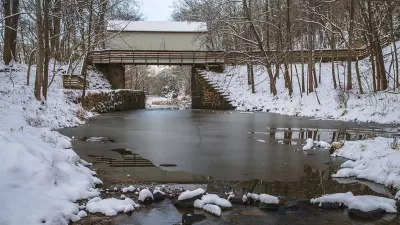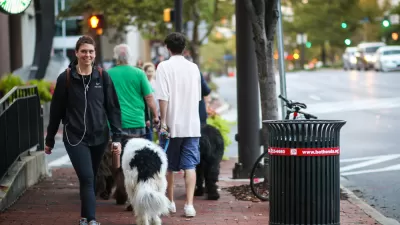Concepts like erasure, greenfield development, and easements figure into this story about a rural community on the fringes of suburban development in Maryland's Montgomery County.

"The 'Farm Road' case in Maryland’s Montgomery County is a troubling example of rural gentrification and historical erasure," according to an article by David Rotenstein.
The process of rural gentrification described is the result of a widening "gap in the low value of the property as agricultural versus a potential greater value if it were to be developed," according to Rotenstein. The "rent gap" in rural communities means that working-class residents are at risk of displacement—just as they would be under similar circumstances in urban areas.
After introducing the concept of rural gentrification, as described above, Rotenstein goes on to examine the example of a community formed around the "Farm Road" in Montgomery County—a "historically African American community created by freed slaves who bought land and cultivated farms near Sandy Spring, about 30 miles north of the U.S. Capitol."
The Farm Road at the center of the controversy was a vernacular place name for a route that emerged "over more than a century of agricultural use," but not as a dedicated public right-of-way. In other words, Farm Road didn't exist, which precipitated decisions by the Montgomery County Planning Department to claim that addresses along the road also didn't exist. That lowered property values for homes along the road and led to disputes between local residents and the planning department, as well as local residents and the residents of nearby developments.
Rotenstein provides more details about the legal fallout from the controversy, which most recently included a ruling by the Maryland Court of Appeals that went against the residents of Farm Road. An article from 2008 by Margie Hyslop provides more details about the controversy as it unfolded.
FULL STORY: Farm Road: Rural gentrification and the erasure of history

Alabama: Trump Terminates Settlements for Black Communities Harmed By Raw Sewage
Trump deemed the landmark civil rights agreement “illegal DEI and environmental justice policy.”

Planetizen Federal Action Tracker
A weekly monitor of how Trump’s orders and actions are impacting planners and planning in America.

The 120 Year Old Tiny Home Villages That Sheltered San Francisco’s Earthquake Refugees
More than a century ago, San Francisco mobilized to house thousands of residents displaced by the 1906 earthquake. Could their strategy offer a model for the present?

Ken Jennings Launches Transit Web Series
The Jeopardy champ wants you to ride public transit.

BLM To Rescind Public Lands Rule
The change will downgrade conservation, once again putting federal land at risk for mining and other extractive uses.

Indy Neighborhood Group Builds Temporary Multi-Use Path
Community members, aided in part by funding from the city, repurposed a vehicle lane to create a protected bike and pedestrian path for the summer season.
Urban Design for Planners 1: Software Tools
This six-course series explores essential urban design concepts using open source software and equips planners with the tools they need to participate fully in the urban design process.
Planning for Universal Design
Learn the tools for implementing Universal Design in planning regulations.
Clanton & Associates, Inc.
Jessamine County Fiscal Court
Institute for Housing and Urban Development Studies (IHS)
City of Grandview
Harvard GSD Executive Education
Toledo-Lucas County Plan Commissions
Salt Lake City
NYU Wagner Graduate School of Public Service




























